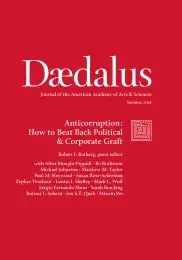Strategies for Advancing Anticorruption Reform in Nigeria
A vast literature documenting the structural embeddedness, grotesque scale, and devastating consequences of political corruption in Nigeria threatens to overshadow the tenacity of the country's anti-corruption “wars,” the recent gains in controlling electoral corruption, the development of a robust national discourse about improving the effectiveness of anticorruption reform, and the crystallization of potentially viable legislative and constitutional reform agendas for promoting good governance. Especially remarkable was the 2015 election of opposition presidential candidate Muhammadu Buhari, who ran on an anticorruption platform. Drawing lessons from those national anticorruption struggles, this essay distills several interrelated steps by which reformist political leaders and activist civil society organizations might advance anticorruption reform in Nigeria and, potentially, elsewhere. These strategies involve depoliticizing key oversight institutions, curbing presidential and gubernatorial discretionary powers, restructuring patronage-based fiscal federalism, expanding and entrenching current transparency laws, and promoting participatory constitutionalism.
A vast literature documents how Nigeria’s huge and ethnically fragmented population, overdependence on unearned oil income, relatively short and unstable history of autonomous postcolonial political development, and fraught institutional structures have spawned a “fantastically corrupt” state, to use former British Prime Minster David Cameron’s apt characterization.1 But prodigious discussions about corruption’s entrenched roots, grotesque scale, and devastating consequences in Africa’s demographic and economic powerhouse often obscure the tenacity of Nigeria’s anticorruption “wars” and their partial gains. These campaigns have resulted in a robust national discourse about improving the effectiveness of anticorruption reform, in the crystallization of concrete legislative and constitutional agendas for promoting good governance, and in occasionally bold, if checkered, governance reforms2 . . .
